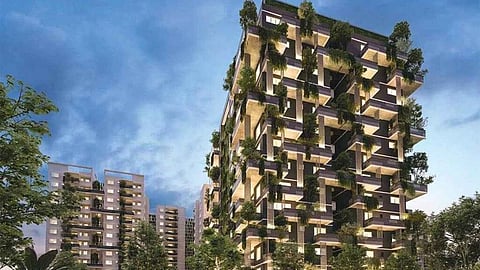

In the midst of fast-growing cities, a silent revolution is underway—one that is anchored in the quest for balance, sustainability, and conscious living. While towering high-rises continue to dominate cityscapes, residents are taking back a bit of nature for themselves in the form of balcony gardens. What was once an afterthought outdoor extension is now transforming into a lush green oasis, providing not only visual beauty but a haven for wellness and green living.
Nowadays, the balcony garden is an essential element of city life for people seeking an intense bond with nature. Whether it's a miniature balcony of a studio flat or a huge veranda of an upscale home, residents of metropolitan areas make optimal use of outdoor space to design micro gardens, green vertical walls, and nature-inspired resting spots that nourish both nature and human psyche.
Micro gardens: Cultivating life in small spaces
The idea of micro gardening—cultivating herbs, vegetables, and flowers in small urban environments—has become incredibly popular among urban dwellers. Balcony railings are now also planters, and tiny pots support rich basil, mint, and cherry tomatoes. With proper container selection and a little creativity, homeowners are converting even the tiniest balconies into verdant oases.
Aside from aesthetic value, microgardens also have a practical function of providing homegrown food. The farm-to-fork movement has made it to the rooftops of city skyscrapers, with home dwellers bragging about plucking fresh greens from their living rooms. Cultivating plants also teaches responsibility and provides a fulfilling respite from the frenzied rhythm of urban life.
Vertical gardens: Building green walls in the sky
For those with limited space on the floor, vertical gardens offer a creative solution. With wall-mounted planters, trellises, and modular green systems, residents are building living walls that bring the beauty of nature without giving up room. These green installations will purify the air and also serve as natural sound barriers, adding a layer of privacy from the hustle and bustle of the city outside.
In an age when concrete tends to dominate greenery, the making of a vertical garden is a conscious choice to bring biodiversity back into urban areas. From flowering climbers to scented herbs, these vertical oases are a reminder that nature can thrive even in the most unexpected settings.
Nature-inspired corners: Spaces for slow living
Aside from food production and gardens, most urban residents are creating nature-infused nooks on their balconies—welcoming places committed to slow living, contemplation, and wellness. A hammock under a cover of ferns, a tea table amidst jasmine vines in the morning, a yoga mat placed by tumbling ivy—these green oases are meant to slow down one's mind and cultivate mindfulness in the everyday.
In the midst of skyscrapers and constant motion of cities, such peaceful oases become a private haven, an oasis in which to rest, breathe, and recharge. They enable a revolution of mental well-being unfolding subtly throughout the urban fabric—an awareness that caring for one's surroundings can be hugely connected with caring for one's own serenity.
The new demand: Garden-ready homes
Alongside these shifting lifestyles, apartment seekers and renters are increasingly prioritising apartments with garden-ready balconies, abundant natural light, and wellness-driven design elements. Balconies large enough to hold some greenery, floor plans that provide the best sunlight, and considerate architecture that dissolves boundaries between in and out are no longer nice-to-have niceties—they are becoming default expectations.
Developers and architects are meeting this demand by incorporating planter space, green ledges, irrigation systems, and sustainable materials into balcony design. The modern urban residences are delineated on how harmoniously the interiors can blend with nature even a few floors above the ground.
An eco-conscious shift in urban living
This growth of balcony gardens indicates a broader shift toward sustainable and deliberate living. With environmental issues at the forefront, city homeowners are becoming aware that each little bit of green matters. One balcony garden helps to mitigate the urban heat island effect, improves air quality, provides habitat for pollinators such as bees and butterflies, and encourages a sense of collective environmental responsibility.
Additionally, building and maintaining a balcony garden cultivates a sense of sustainability and patience—values that many urban dwellers are increasingly looking to integrate into their daily routines. It's about growing a handful of herbs for consumption and the feeling of being self-sufficient. It's about nurturing a flowering vine for its appearance and the happiness it instils in being present and appreciative of life's slower pace.
A movement rooted in mindfulness and growth
The balcony garden is a manifestation of a shared desire for slower, greener, and more mindful living. By repurposing high-rise balconies as lush gardens, urban residents are redefining the script of city living, proving that in the midst of the hubbub of concrete and steel, there is always room to nurture life, beauty, and community.
As cities become increasingly vertical, the need of designing green spaces is growing to keep us connected to our roots, our duty, and the delight of living more in touch with nature. The balcony garden movement that has erupted is slowly sowing the seeds of a more harmonious, sustainable future.
(The author is CMD, Mana Projects)